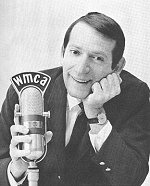
B. Mitchell Reed
voc, 1926-1983 US
Pop
A.k.a. Burton Mitchel Goldberg
He was the fastest tongue in the east —and west— a rapid-fire entertainer backed by a cacaphony of bells and horns. But he also had an alter-ego, a slow-talking, introspective personna that made him a pioneer in FM underground radio. B. Mitchell Reed, whether he talked at you or to you, remains one of the great legends of rock radio. Born Burton Mitchel Goldberg in Brooklyn, New York City, USA, on 10 June 1926, Reed originally planned a career teaching political science. But, as he admitted years later, the glamour of the radio business seemed more appealing to him than life in the classroom. Education's loss was radio's gain. After getting his radio start in Baltimore, Reed got his first major job when he landed the all-night "Birdland Jazz Show" at New York's WOR-AM. In 1957 he moved to KFWB Los Angeles and did another jazz show called "Boy On A Couch", the name deriving from the fact he was undergoing analysis at the time. On 2 January 1958, Reed became part of Chuck Blore's legendary "Color Radio"; one of the earliest Top 40 formats. Holding down the 6-9 pm shift, he entertained southern California listeners with a high energy show that included a fast delivery, a tooting horn and cowbells. Once, he was asked why he talked so fast? His reply: "you're listening too slow". In 1963, Reed took his act to his hometown of New York and the station which most people identify him with, WMCA. Reed spent two colorful years holding down the 7-11 pm shift, further establishing himself as one of America's top radio personalities. While there, he played a major role in introducing The Beatles to the Big Apple (not that they needed any help). Reed left New York in 1965 (4000 people saw him off at the airport) and returned to KFWB in LA for the "The Wide, Wide Weird World of BMR". But music was changing, and Reed's approach changed with it. Soon the horns and bells disappeared from his show, as did the Top 40 delivery. In its place was album rock, with less (or at least more meaningful) patter and more platter. In late 1967, B. Mitchel Reed helped FM rock pioneer Tom Donahue launch KPPC-FM Pasadena serving Los Angeles, one of the first so-called "progressive rock" or "underground" stations. In early Summer 1968, Reed and Donahue provided four hours of taped album rock daily on KMET-FM Los Angeles to get the station started. By autumn of 1969, KMET-FM was 12 hours Live. By 1971, KMET would evolve into a Live 24-hour Rocker at FM 94.7 with a very strong signal. In the 1970's, the Beemer moved on to such stations as KRLA, KMET and KLOS, his legend growing and evolving just as rock music was doing the same. As LA Times columnist James Brown wrote, "he kept his mind open and his spirit free". It was in 1972 that Reed was asked to recreate his old WMCA show for Watermark Productions, which was putting together the now famous "Cruisin'" series. As legend has it, the Beemer needed 18 cups of coffee to get his energy level back to where it was in the early 1960's, when he actually did the show. Many "Cruisin'" buffs consider it one of the best —if not the best— of the series. Reed was plagued by health problems during his later years. He had a cornea transplant in 1974, but he refused to let it slow him down, even doing his show from a hospital bed. In 1978, he had successful coronary bypass surgery. In 1981, BMR became the first host of ABC's Rockline program, his first guest being Joe Walsh. His lingering heart problem overtook him, however, and he died of heart failure, aged 56, on 16 March 1983 in Malibu, California, USA.
Plays With
| The WMCA Good Guys |
